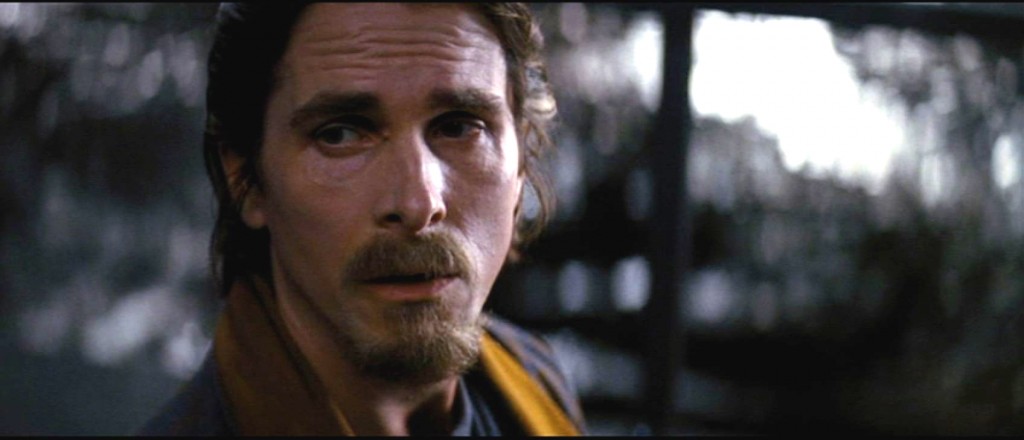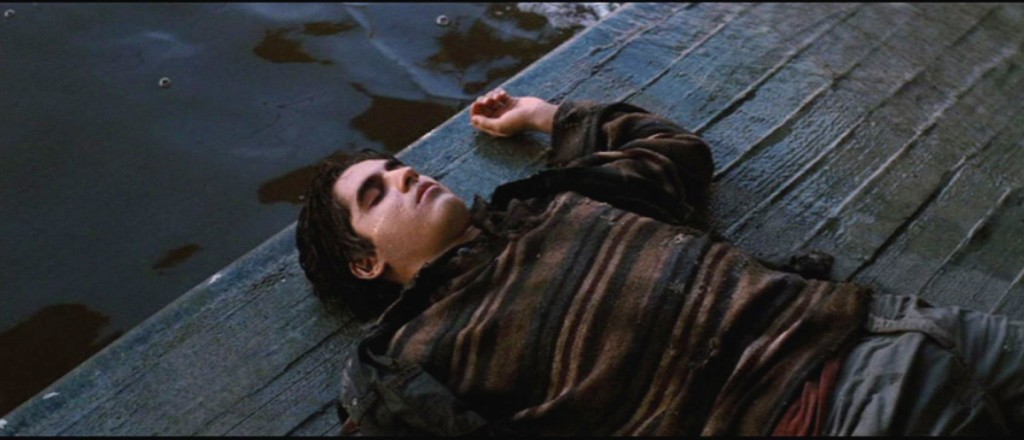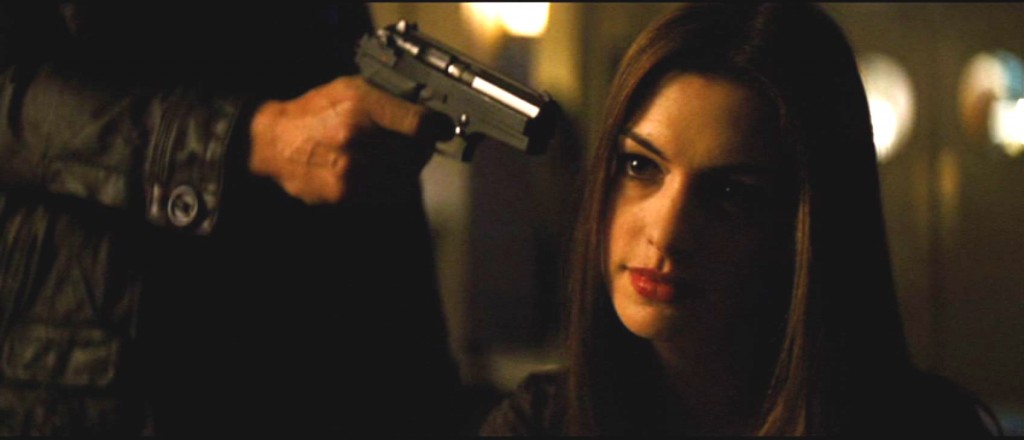Batman: The Dark Knight Rises part 3
The time has come to ask: What does Bruce Wayne want?
We’ve seen that he’s eradicated organized crime in Gotham City, so theoretically he’s overcome the sense of helplessness he felt about his parents’ deaths — there will be no more Joe Chills running around making orphans out of billionaires’ sons. Now, it would seem, he’s looking for a way out, a way to move on, to finally emerge from his cave, bury his parents and his girlfriend (and her boyfriend Harvey Dent) and become a fully-integrated man. The Dark Knight Rises is, at its heart, a dramatization of how a world-class control freak finds a way to let go.
But “to let go,” that’s not what he wants, that’s what he needs. What he wants is the opposite: to close the world off, to brood, to pout, essentially, to consider his losses and to hell with the world.
Meanwhile, out in the real world, far away from the cocoon of the Batcave, there is still real ugliness in the world. Idealistic cop Blake finds a drowned orphan in a storm drain and goes to investigate the boy’s death. An orphan himself, he goes to the orphanage and learns that, surprise, funding has been cut, sending older boys out into the streets to live as they can. The funding, as it happens, is from Wayne Enterprises, as we begin to see how Bruce’s billionaire decisions (“I will save the world”) affect millions of everyday people. Even if Bruce had not lost all his money in his save-the-world project, the fact remains that the world, our world, is still in the thrall of the moods of the super-rich. The wealthy man has an urge, and that urge generates a huge shift in capital, creating jobs for some and throwing others out of work. Or, to put it another way, Bruce sneezes and all of Gotham catches a cold. As Kurt Vonnegut put it once, “The economy is nothing more or less than whatever the world’s wealthy people, sane or insane, drunk or sober, decide they want to do that day.” In this case, Bruce has defunded the orphanage, forcing this orphan out into the world, where he has drowned in a storm drain. Investigation leads Blake to learn that the drowned orphan had “found work” down in the sewers, and that the other boys at the orphanage, boys young enough to have missed out on the Joker’s rampage, long for the days when the Dark Knight will return. The boy Blake questions wouldn’t think much of Bruce Wayne, but Batman is something else — which was, of course, the whole point of Batman, that he is not Bruce Wayne, that he is not even a man, more of an ideal. Bruce Wayne is failing all over the place, but Batman could never let you down (especially if he never shows up).
That night, Selina Kyle delivers Bruce’s fingerprints to Stryver, a creepy dude who works for Daggett (although we don’t know that yet). Stryver (a crook, named Stryver!), having received the prints, decides to kill Selina, but she’s brought an ace in the hole, Congressman, the congressman from the party two nights ago. She turns the tables on Stryver and we see that she is an inversion of Batman — a woman instead of a man, a thief instead of a crime-fighter, but highly trained in hand-to-hand combat, fast on her feet, skillful at manipulation and wise in the ways of the cowardly and superstitious. Not only can she shoot her way out of a tight spot, she knows how to turn on the waterworks to divert suspicion.
Selina gets away scot-free, but Stryver disappears into the sewers. Gordon gives chase and is taken to Bane, who has set up a huge construction site below the city. No criminal can escape into a city’s sewers without invoking Jean Valjean, but comparison to Les Miserables is intentional — Victor Hugo’s tale of class warfare and haunted men resonates throughout the Nolan trilogy, and no doubt Bane sees himself as not a psychopath but a revolutionary, a man delivering the bill to Gotham’s wealthy.
Bane takes from Gordon his speech regarding Harvey Dent, Gordon escapes deeper into the sewers (pulling a Jean Valjean on Jean Valjean) and Bane kills two more henchmen to demonstrate his mania for obedience. Odd that a revolutionary would also be an autocrat, but that’s the way of the world — the capitalist may kill you inadvertently, but the fanatic will kill you intentionally, and feel good about it.



Odd that a revolutionary would also be an autocrat
I’m not sure I see Bane as a revolutionary, though. Sure, he talks the talk, with his extremist (per)version of the Occupy rhetoric — but that’s just a tool, a mask to conceal his real cause, which is Talia and the League of Shadows. And their purpose is the destruction not just of the wealthy, but of what society has built for itself. They’re nihilists, not socialists.
He certainly doesn’t seem to have any plan for governance.
He’s not out to build anything, only tear down.
If I’m remembering theory class and The Big Lebowski correctly, nihilism is belief in nothing. Bane and the League of Shadows have a virtue in mind as their end game. They want to restore balance to the world. They want to destroy something because it’s become immoral, not just for the sake of destroying it. That’s part of why Bane adopts the Occupy rhetoric. Both Bane and the people of Gotham want to destroy the established order, just for different reasons. The Joker is more of the nihilist in that he doesn’t really have a goal other than anarchy/chaos. He wants destruction purely as an end in itself.
I think someone makes a Howard Hughes joke about the Bruce the Recluse early in the movie. He also reminds me a little of Achilles, in his years-long refusal to enter the fray. (And Achilles was known for leg injury, but I wouldn’t read too much into this.)
In a way, Bruce undergoes the same trials as Jean Valjean but in a different order: he’s an unjustly pursued fugitive at the end of THE DARK KNIGHT, and unjustly held in prison in RISES. Or is Bruce really Javert, the relentless but outmatched investigator trying to catch Bane’s Valjean?
(And can it be a coincidence that Anne Hathaway, who plays Selina, will probably win Best Supporting Actress next month for singing “I Dreamed a Dream” in LES MISERABLES? Yes. It’s totally a coincidence.)
Daggett makes a Hughes reference, yes, eight-inch fingernails and jars full of urine. Or is that a Leonardo DiCaprio joke at this point?
When I think of Jean Valjean, I don’t think of “unjustly pursued,” but “haunted by his past,” which is certainly true of Bruce as well. Valjean never escapes the deeds of his youth, ever, no matter how hard he tries, and Bruce could say the same.
It’s a Hughes joke but the face I put on Hughes when he is invoked is Leonardo DiCaprio’s.
Sometimes Howard Hughes jokes make me think of Willard White from DIAMONDS ARE FOREVER.
Oof.